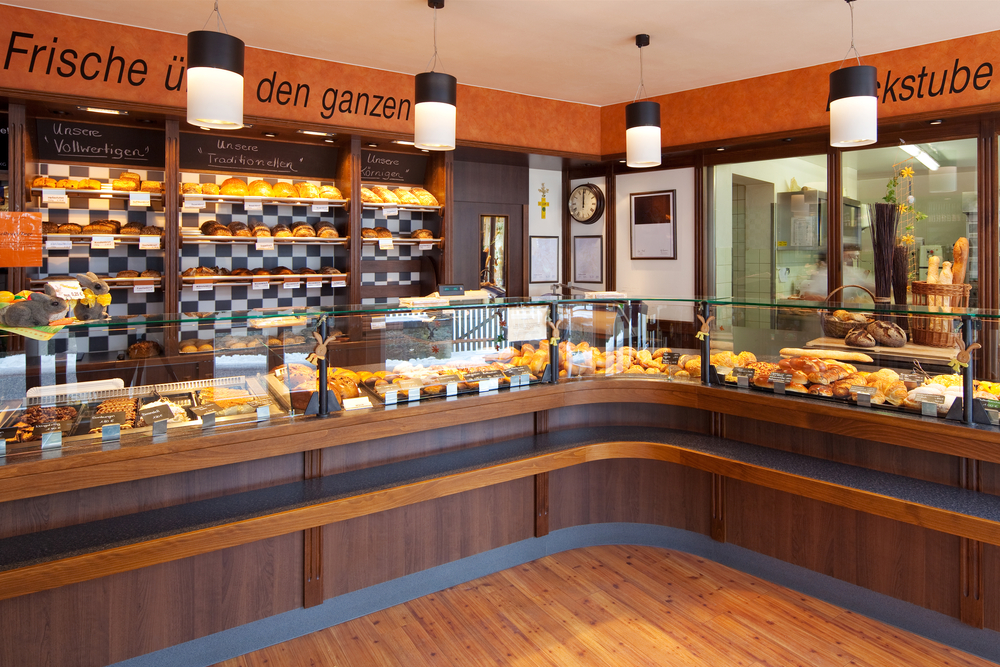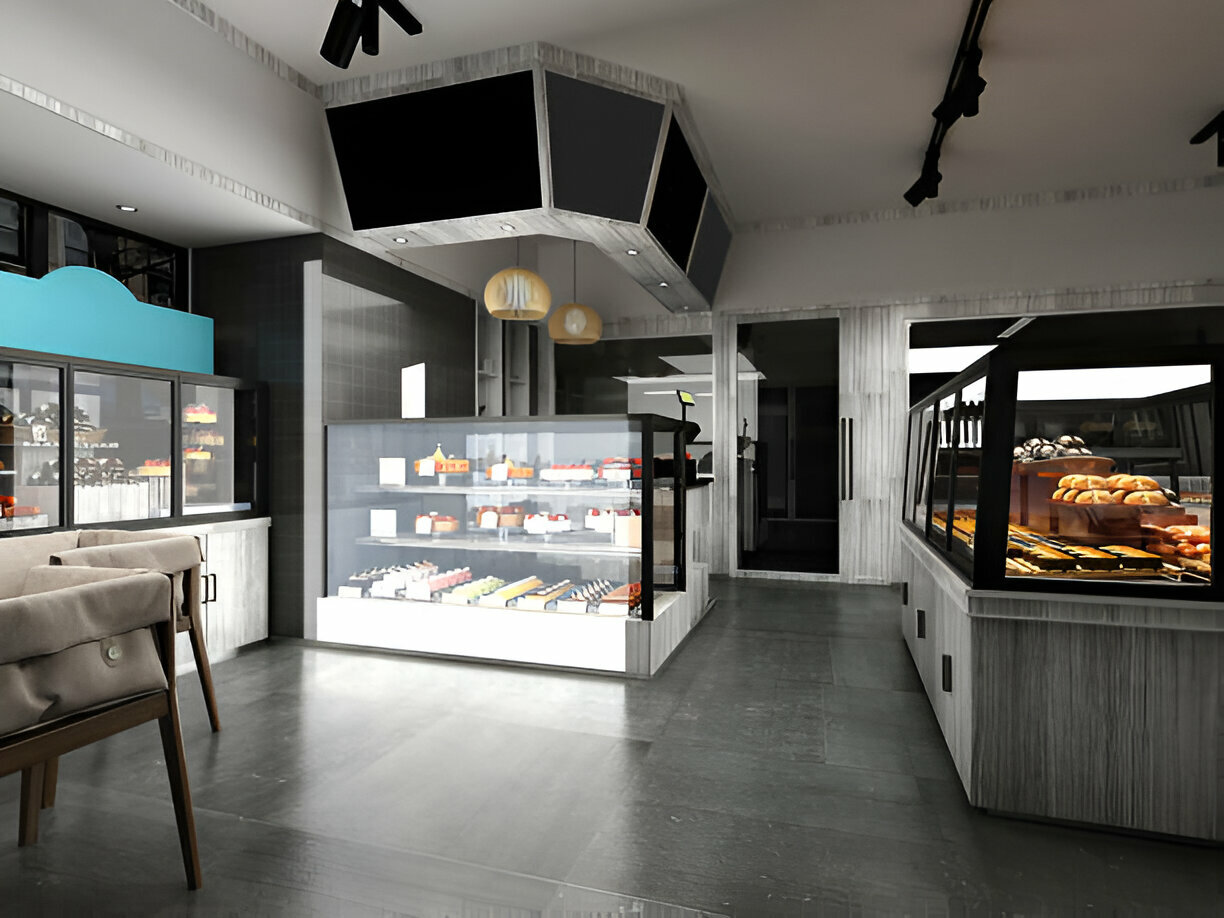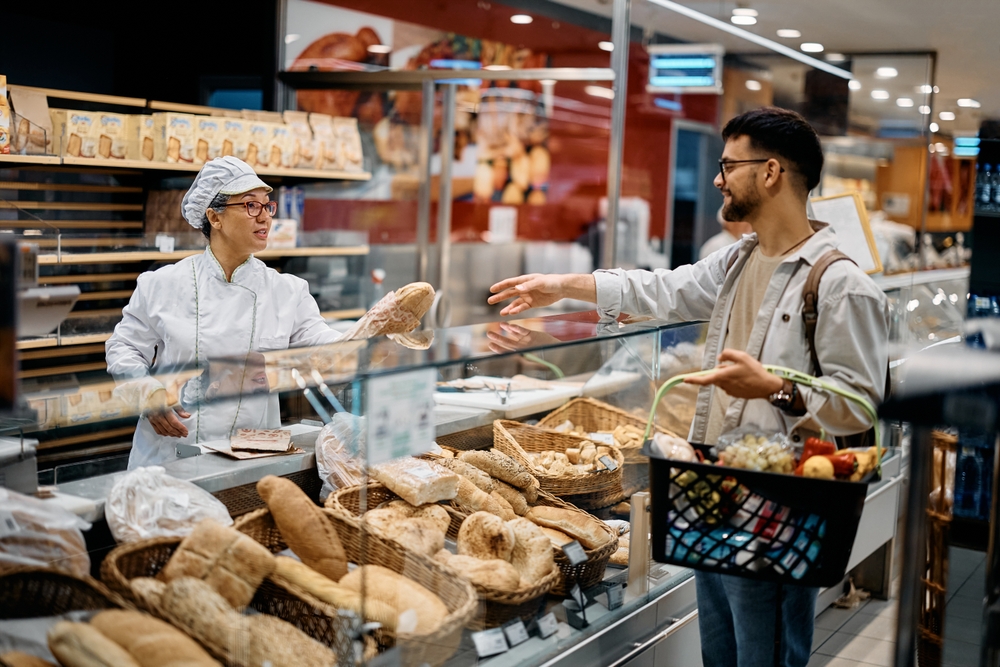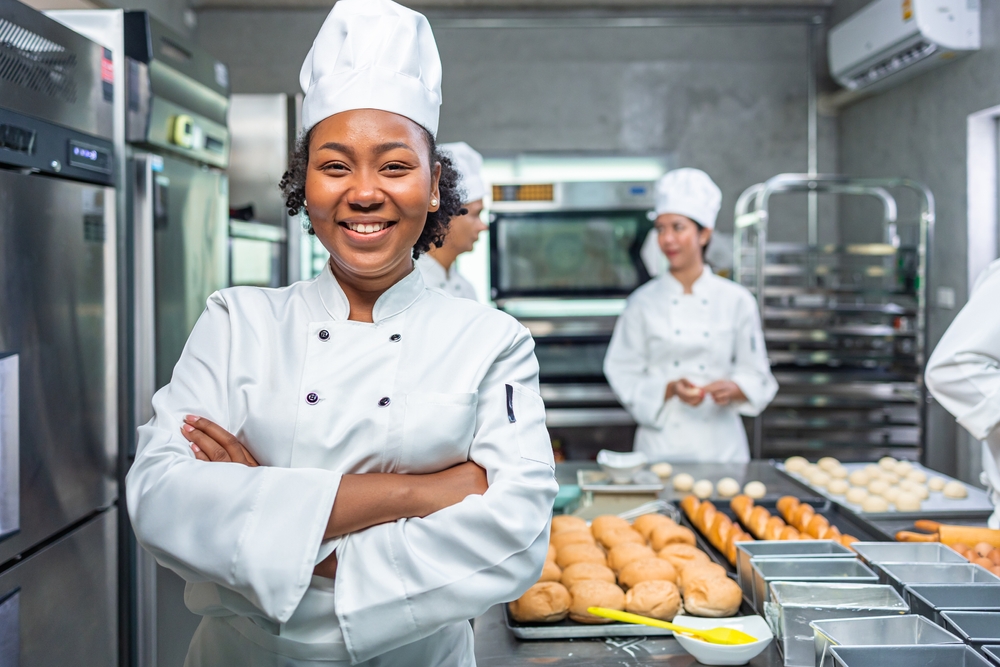Different Types of Bakeries: Find Your Perfect Match
By Hamza Benhlima · 19. June 2024
This guide breaks down the different types of bakeries, giving you a clear look at retail, wholesale, and specialty bakeries.
You’ll get to know their customers, how they run things, and how they stand out in the community.
Key Takeaways
- Understand your bakery type: Retail for hands-on service, wholesale for B2B bulk orders, or specialty for niche markets. 🥐
- The bakery experience matters: Choose your service style to fit your brand, from cosy cafes to efficient counter service to innovative food trucks and pop-ups. ☕🚚
- Use automation to nail consistency and quality in baking processes, and get creative with marketing to whip up business and customer loyalty. 🏆
The Different Types of Bakeries
 modern bakery interior glass display counters
modern bakery interior glass display counters
In any town or city, the bakery scene is a colourful mix of tastes and traditions. From cosy home bakeries to big wholesale operations, each place brings its own flavor to the baking world.
If you’re thinking about starting a bakery, there are a few things to keep in mind, like:
- who your customers will be
- how much you can spend
- what the competition looks like
- where you’ll set up shop
- what people in your area want
The secret to a successful bakery is understanding the different types of bakeries. These differences affect visibility, creativity and growth potential.
Let’s explore what sets each bakery business apart.
The Charm of Retail Bakeries
A retail bakery is where the sweet scent of success starts, with a cozy storefront inviting customers to come in and enjoy a variety of baked goodies.
These bakeries are more than just spots to grab fresh bread or a slice of cake; they’re community hangouts where people gather, sip on coffee, and enjoy the personal touch of hands-on service. 🥖☕
Retail bakeries often go beyond just baked treats, adding cafe favorites like soups and salads to draw in a diverse crowd.
Here, bakers can get creative, whipping up everything from flaky pastries to decadent truffles.
And with direct feedback from their customers, retail bakers can easily tweak their menu to match the latest tastes and trends. 🥐🍰
The Breadth of Wholesale Bakeries
On the flip side, wholesale bakeries operate on a much larger scale, cranking out big batches of baked goods for grocery stores, restaurants, and other businesses.
These baking giants usually skip the storefront and go straight for a commercially licensed kitchen where efficiency is the name of the game.
With a business-to-business model, they supply clients like hotels and coffee shops, keeping them well-stocked with fresh bread and pastries to please their many customers. 🍞🏨
While they might not interact much with customers, wholesale bakeries still make a huge impact by ensuring other places are always filled with delicious treats. 🍩
Specialty Bakeries: Wedding Cakes and More
Then there are the rockstars of the baking world—specialty bakeries.
These talented artisans focus on specific goodies like:
- wedding cakes 🎂
- cupcakes 🧁
- macarons
- artisan breads 🥖
- pastries 🥐
They build a name for themselves by creating stunning, unique treats that are as Instagram-worthy as they are delicious.
Whether it’s for a couple’s big day or another special event, these bakeries know how to wow their customers.
In the competitive world of specialty baked goods, staying innovative and paying close attention to detail are key to standing out.
By perfecting their craft and targeting a specific market, these bakeries can carve out a niche even in a crowded field.
Crafting Your Bakery Concept
 modern interior of a bakery shop
modern interior of a bakery shop
Diving deeper into the bakery world, it’s clear that the service style can be just as crucial as the baked products themselves.
From the sit-down comfort of bakery cafes to the grab-and-go convenience of counter service bakeries, the way you serve your customers can define your bakery’s brand and influence its success.
Understanding different bakery service styles can help you make the right choice for your business.
In today’s fast-paced world, offering delivery services can significantly extend your reach, bringing your baked delights straight to the doors of eager customers well beyond your local community. 📦
A Welcoming Bakery Cafe
A bakery cafe is a charming hybrid among bakery types, offering a cozy atmosphere where the aroma of freshly brewed coffee blends with the scent of just-baked treats.
These places serve up a mix of baked goodies along with hearty cafe fare like sandwiches and soups, turning it into a full-on food service haven. ☕🥪
But it’s not just about the food; bakery cafes are community hubs where people come together, chat, and enjoy the personal touch of a friendly atmosphere.
They draw in regulars who come not just for a quick snack, but for the whole experience, the vibe, and the chance to relax and savor the moment.
On-the-Go Service Bakeries
 young man buying bread at the bakery
young man buying bread at the bakery
For those always on the move, counter service bakeries offer a quick fix for those sweet cravings.
These bakeries are all about efficiency, with a streamlined operation that caters to walk-in customers and those needing a fast takeaway.
Without the need for a dining area, a counter service bakery can keep costs down while still serving up a delicious array of cakes and pastries. 🎂
With fewer staff needed, these bakeries can focus on quality and speed, making sure every customer leaves with a smile and a tasty treat in hand. 😋
Innovating with Food Trucks and Pop-Ups
These mobile marvels bring a fresh spin to the traditional bakery concept, offering the flexibility to set up shop wherever the customers are.
Whether parked by a bustling festival or nestled in a neighborhood park, bakery food trucks and pop-ups can capture the hearts of a diverse crowd. 🚚🎉
With their affordability and the novel, personalized experiences they deliver, these innovative ventures provide an exciting platform for beginning entrepreneurs to make their mark in the food industry.
Behind the Scenes: Starting Your Own Bakery
 Smiling Bakers In The Bakery Kitchen
Smiling Bakers In The Bakery Kitchen
Transitioning from enjoying delicious baked goods to becoming a bakery owner is a journey packed with important decisions and investments.
Starting a bakery isn’t just about perfecting your recipes; it’s also about:
- Finding the right spot
- Outfitting your kitchen
- Navigating the financial side of things
- Considering construction costs
- Buying top-notch equipment
Every step needs careful thought to make sure your bakery business has a solid foundation.
Location is super important for attracting the right customers and keeping rental costs in check, which directly impacts your profitability.
Plus, staying on top of permits and licenses is key to meeting health and business regulations, ensuring your bakery runs smoothly and safely. 🏙️
From Home Bakery to Business Owner
For many aspiring bakers, the dream really kicks off in the cozy comfort of their home kitchen.
Running a home bakery lets you whip up your delicious creations and sell them directly to customers, whether it’s through delivery, pickup, or at local events and markets.
This setup keeps your starting costs low and lets you build a more personal connection with your customers. 🏡🍪
Not all states allow home bakeries, but for those that do, it’s an awesome stepping stone for bakers looking to go from hobbyists to full-on business owners, paving the way to eventually opening a larger bakery. 🚀
Joining a Small Business Incubator
Starting a bakery business can be overwhelming, but a small business incubator can be a real game-changer for those seeking guidance and support.
These incubators provide aspiring bakery entrepreneurs with mentorship and a wealth of resources, helping them to mold their business model into a sustainable enterprise. 🌱
By connecting bakery owners with sales opportunities and offering shared resources like a commercially licensed kitchen, incubators can ease the hefty investment typically required to start a bakery.
This nurturing environment not only reduces initial costs but also encourages innovation and growth, launching new businesses into the market with confidence. 🚀
Atmosphere and Customer Experience
The essence of a bakery goes beyond just the baked goods; it’s the vibe and customer experience that turn first-time visitors into loyal regulars.
A well-thought-out design, from the storefront to the interior, creates an inviting space where customers feel comfortable and eager to come back.
The right mix of colors, lighting, seating, and decor can all add to a bakery’s charm, but truly understanding your target audience’s preferences is what makes a place shine.
Adding personal touches, like decor that tells your bakery’s unique story or fun design elements, can leave a lasting impression, helping to build a loyal customer base and making your bakery stand out.
Creating an Allergy-Friendly Environment
With more people having dietary restrictions and being health-conscious, offering an allergy-friendly environment isn’t just nice—it’s a smart move.
Making sure your bakery meets food hygiene inspections and labeling laws is crucial for the safety of customers with allergies.
Implementing a Food Safety Management System (FSMS) helps keep everything clean and safe, so those with dietary restrictions can enjoy your treats without worry. 🌱
By offering options like gluten-free, vegan, and allergen-free items, your bakery can appeal to a broader range of customers, showing that you care about everyone who walks through your doors.
Marketing Your Bakery to the Local Community
Marketing your bakery is the icing on the cake when it comes to building a successful business.
With the power of social media, your bakery’s delectable creations can tantalize a broader audience, leveraging likes, comments, and shares to expand your online presence.
Embracing user-generated content, such as customer photos and reviews, can sway purchase decisions and foster a community around your brand. 📸🍰
Furthermore, using short-form video content on platforms like Instagram and TikTok can capture the essence of your bakery in a way that resonates with viewers, driving engagement and visibility.
Influencer partnerships can also amplify your reach, helping your bakery rise in the ranks of social media search findings. 📈
Beyond the digital world, forming partnerships with local businesses can extend your customer reach and create mutually beneficial relationships.
And by customizing your bakery’s service style, you can offer a unique customer experience that ensures your bakery remains a memorable destination.
Summary
Starting a bakery is an exciting journey filled with sweet rewards and unique challenges.
This guide covers everything from choosing your bakery type to creating a memorable customer experience and implementing effective marketing strategies.
We’ve highlighted how automation can enhance operations and how catering to dietary restrictions can broaden your clientele.
Whether you’re dreaming of opening a cozy retail bakery, specializing in stunning wedding cakes, or hitting the road with a bakery food truck, the possibilities are endless.
Let this guide be the foundation that helps your bakery business rise to success! 🏆
Frequently Asked Questions
What are the main differences between retail and wholesale bakeries?
The main differences between retail and wholesale bakeries are that retail bakeries focus on selling directly to customers from a physical storefront with a cozy atmosphere, while wholesale bakeries focus on large-scale production and selling their products to other businesses without a storefront for customer interaction. Retail bakeries often offer a broad range of baked goods and may include cafe items, while wholesale bakeries sell to businesses such as grocery stores and restaurants.
Can a bakery be both a retail and wholesale business?
Absolutely, some bakeries function as a combination of retail and wholesale, selling to individual customers in their storefront while also providing wholesale products to other businesses. This allows them to cater to both consumer sales and bulk orders from corporate clients.
What are some considerations when choosing a location for a bakery?
Consider the target customer demographic, visibility, foot traffic, competition in the area, and rental costs when choosing a bakery location. These factors impact the customers you’ll attract and the profitability of your bakery.
How can a bakery cater to customers with dietary restrictions?
To cater to customers with dietary restrictions, a bakery should offer a variety of products like gluten-free, vegan, and allergen-free items, while being strict about food safety and labeling laws. This ensures that all customers can enjoy safely and deliciously, without worrying about their dietary restrictions.

